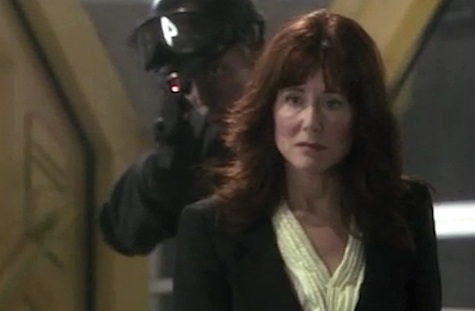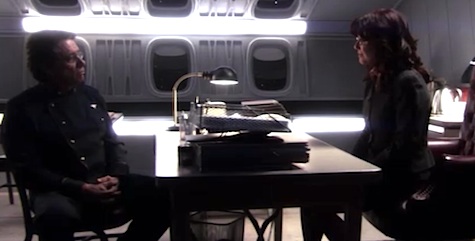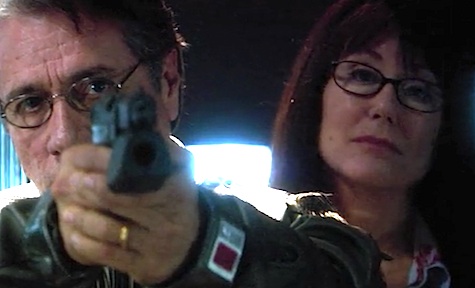Four years ago, a historic election rocked America…but 2008 was also the year Battlestar Galactica went off the air, to the dismay of fans everywhere. The story of our distant human relatives forever in conflict with their robot creations—The Cylons—was not only super entertaining, full of real drama and some of the best sci-fi television ever; it was also politically charged in surprising and unexpected ways. BSG was a show where the good guys waterboarded the bad guys, and the lines between terrorist, political idealistic, freedom fighter, religious zealot and more were all blurred and discussed in a big, messy, outer space opera.
With the U.S. Presidential election approaching, I’d like to take a break from all the current political divisiveness to talk about my favorite president—Laura Roslin—and her fascinating ideological shifts throughout the long road to a planet called Earth.
How Laura Roslin initially becomes President of the Twelve Colonies is one of those great conceits that—even without all the spaceship/robot stuff—could have been a TV show all on its own. Every single person in line to become president ahead of Roslin had been killed by a nuclear attack, making her—the Secretary of Education—the legal successor to the office. Even if this story took place on regular Earth, it’s a wonderful premise! Immediately, Commander Adama is screaming at poor Lee Adama that he’s “taking orders from a school teacher!” From the first episode of Battlestar Galactica, Laura Roslin is portrayed as a nurturer, a teacher, and someone certainly on the political left. Meanwhile, Bill Adama, the de facto military leader of the entirety of humankind, is depicted as a conservative, militaristic person, not only in contrast with Laura but also with his own son, Lee, who is also a member of the military.
Throughout most of the first season, Adama reluctantly agrees to let Roslin do her liberal stuff: preserving freedoms, organizing elections, caring about people’s rights. But it’s not portrayed as black and white: though a mutual respect starts to develop between the two characters, the easy classification of liberalism versus conservativism comes crashing down in the episode “Flesh and Bone.”
In this episode, the humans capture a Cylon agent and Kara “Starbuck” Thrace uses Guantanamo-style techniques to torture him for information. It’s disturbing in and of itself because Starbuck is one of the good guys. But things get even more intense when President Roslin comes to shut down the whole operation. Roslin is disgusted, as if she’s just walked in on a murder-in-progress, and clearly annoyed by the fact that Starbuck is obviously torturing the Cylon. She takes the more liberal approach of to trying to reason with Lebeon, getting him to tell the truth about the supposed bomb that’s been placed somewhere in their vast space fleet. In a way, echoes of Captain Kirk refusing to kill a hissing lizard-man are evoked here. “No!” Roslin seems to be saying, “I won’t kill today!” But then Lebeon grabs her, tells her Adama is a Cylon, and a switch flips. Suddenly, Roslin becomes more hardcore and conservative than Adama, and anyone else in the military, particularly Starbuck, who is standing right there.

“Put this thing out the airlock,” Roslin tells the guards, “You don’t keep a dangerous machine laying around. You get. Rid. Of. It.” And she kills Lebeon, just like that.
From this point on, you can’t really call Laura Roslin a bleeding heart liberal anymore. Sure, she is certainly more compassionate on the surface than Adama, but possibly not in practice. The end of the first season involves a major disagreement between Adama and Roslin as to the direction the fleet should take. Adama decides he’s had enough of her and that it’s time for martial law. Sending Col. Tigh and his son Lee over to arrest her was probably a pretty bad move, because the very liberal Lee Adama (easily the most liberal character on the show) stands up for the President and gets himself locked up. Of course, all of this goes to hell when Commander Adama gets shot by sleeper agent Boomer right in the middle of everything.
Though these dire situations resolve themselves somewhat in a few episodes during the second season, everything about Laura Roslin’s political tendencies are in flux. If she thought Bill Adama was a hardcore, militaristic and conservative guy, he’s nothing compared to Admiral Cain of the Battlestar Pegasus. Cain is ruthless to a fault, a by-any-means-necessary military leader with little or no concern for civilians or the collateral damage her decisions may cause. Sure, none of the characters on Battlestar Galactica are in an ideal situation to have idealistic political opinions. Characters are frequently motivated by extreme events pressuring them into certain political straightjackets. It is clear that these are things people would never do if they lived in a regular political climate. When Roslin suggests to Adama that he has to assassinate the power-hungry Admiral Cain, it gives one pause—what would any political leader do in an environment with dwindling numbers of people, beset by killer robots hidden in plain sight?
The most heartbreaking issue President Roslin is forced to deal with is whether abortion should still be legal, considering that human beings are becoming an endangered species. I’m fairly confident the writers of BSG were all fairly liberal people, and I’d be willing to bet, that like me, they’re totally pro-choice.
But, it takes guts to imagine a scenario where someone who is pro-choice would be forced to think about her ideals differently. In this moment, Roslin’s ideals and Roslin’s politics become two separate things. As events continue onward she also adopts a religion that she had never considered before coming aboard Galatica. But she doesn’t impose it on people, even though many worry she is simply by making decisions based on her newfound faith.

A “faith-based” president who orders assassinations of her own people, and is occasionally anti-choice, certainly doesn’t sound like it fits into the familiar definitions of liberal or conservative. Regardless of any of our own political affiliations, the story of Laura Roslin is illuminating because it demonstrates just how dependent on context certain political viewpoints can be. By the end of Battlestar Galactica, you could argue that Adama becomes much more of a liberal than he was at the start, possibly because he and Roslin exchanged some kind of political ideological energy. It reminds one of a conversation taking place in another galaxy, far, far away, populated by alien humans, in which Obi-Wan tells Luke Skywalker that “many of the truths we cling to depend greatly on our point of view.”
In Battlestar Galactica, for Laura Roslin, the political truths she clings to depend greatly on humanity’s chance for survival. And in space, with Cylons all around, no one cares if your spaceship is a red spaceship or a blue spaceship.
Ryan Britt is a staff writer for Tor.com. He doesn’t understand what was meant by “grab your gun and bring in the cat” and really thinks the writers were drunk with power on that one.










